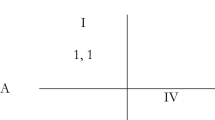Abstract
A unanimously adopted democratic constitution is a contract between the people as principal and the government as agent. However, none of the incentive devices employed in private principal-agent contracting assure enforcement of a constitution. Under majority voting, candidates for the job of agent cannot win the job without promising tobreak the contract, and the agent cannot be re-elected unless he keeps that promise.
Similar content being viewed by others
References
Abramson, J. (October 26, 1989) “In Nation's Capital, Scandal Need not Cut One's Speaking Fee.”Wall Street Journal.
Anderson, T. L. and Hill, P. J. (1986) “Constraining the Transfer Society: Constitutional and Moral Dimensions.”Cato Journal 6: 317–341.
Bastiat, F. (1950)The Law. Reprint of the 1850 work, with English translation by Dean Russell. Irvington-on-Hudson: Foundation for Economic Education.
Birrell, G. A. (1988) “Defamation: A Tale of Two Countries.” In:Democracy: Its Strengths and Weaknesses Andrew R. Cecil Lectures on Moral Values in a Free Society IX: The University of Texas at Dallas.
Buchanan, J. M. (1977) “Law and the Invisible Hand.” In: Bernard H. Siegan (ed)The Interaction of Economics and the Law. Lexington, Mass: D. C. Heath and Co.
Buchanan, J. M. (1975)The Limits of Liberty. Chicago: University of Chicago Press.
Buchanan, J. M. and Tullock, G. (1962)The Calculus of Consent. Ann Arbor: University of Michigan Press.
DeJong, D. V., Forsythe, R., and Lundholm, R. J. (1985) “Ripoffs, Lemons, and Reputation Formation in Agency Relationships: A Laboratory Study.”Journal of Finance 40: 809–820.
DiLorenzo, T. J. (1985) “The Rhetoric and Reality of Tax Reform.”Cato Journal 5: 401–406.
Dougan, W. R. and Munger, M. C. (1989) “The Rationality of Ideology.”Journal of Law and Economics 32: 119–142.
Gannon, J. and Landauer, J. (June 15, 1976) “Despite Sex Scandals, Self-Serving Actions are the Major Problem.”Wall Street Journal.
Green, S. L. (1986) “The Abrogation of Gold Clauses in 1933 and its Relation to Current Controversies in Monetary Economics.”Economic Review Federal Reserve Bank of Dallas: 1–17.
Higgs, R. (1987)Crisis and Leviathan: Critical Episodes in the Growth of American Government. New York: Oxford University Press.
Holmstrom, B. (1979) “Moral Hazard and Observability.”The Bell Journal of Economics 10: 74–91.
Jackson, B. (June 25, 1986) “Lobbyists Who Pay Lawmakers $1,000 an Hour Have Found an Effective Way to Communicate.”Wall Street Journal.
Jackson, B. (July 8, 1988) “Representative Wright's Dealings with Lobbyists, Investors Span Many Years, but Failed to Make Him Rich.”Wall Street Journal.
Jensen, M. C. and Meckling, W. H. (1976) “Theory of the Firm: Managerial Behavior, Agency Costs, and Ownership Structure.”Journal of Financial Economics 3: 305–360.
John, K. and Nachman, D. C. (1985) “Risky Debt, Investment Incentives, and Reputation in a Sequential Equilibrium.”Journal of Finance 40: 863–878.
Kalt, J. P. and Zupan, M. A. (1984) “Capture and Ideology in the Economic Theory of Politics.”American Economic Review 74: 279–300.
Kau, J. B. and Rubin, P. H. (1979) “Self-Interest, Ideology, and Logrolling in Congressional Voting.”Journal of Law and Economics 22: 365–384.
Klein, B. (1985) “Self-Enforcing Contracts.”Zeitschrift für die Gesamte Staatswissenschaft 141: 594–600.
Kopel, D. P. (June 24, 1988) “Rowan Case and the Need to Bear Arms.”Wall Street Journal.
Landauer, J. (April 30, 1976) “False Travel Expenses Net Some Congressmen Thousands of Dollars.”Wall Street Journal.
McChesney, F. S. (September 25, 1987) “Extortion for Not Passing Laws is a Political ‘Big Easy.’”Wall Street Journal.
Meckling, W. H. and Jensen, M. C. (1977) “Between Freedom and Democracy.”The Banker: 39–49.
Merville, L. J. and Mishra, C. (1989) “On Self-Enforced Risk Sharing and Management Contracts.” Working Paper: School of Management, University of Texas at Dallas.
Nozick, R. (1974)Anarchy, State, and Utopia. New York: Basic Books.
Peltzman, S. (1980) “The Growth of Government.”Journal of Law and Economics 23: 209–287.
Peltzman, S. (1984) “Constituent Interest and Congressional Voting.”Journal of Law and Economics 27: 181–210.
Peltzman, S. (1985) “An Economic Interpretation of the History of Congressional Voting in the Twentieth Century.”American Economic Review 75: 656–675.
Ross, S. (1973) “The Economic Theory of Agency: The Principal's Problem.”American Economic Review 63: 134–139.
Schumpeter, J. A. (1950)Capitalism, Socialism, and Democracy, 3rd ed. New York: Harper and Row.
Shavell, S. (1979) “Risk Sharing and Incentives in the Principal and Agent Relationship.”The Bell Journal of Economics 10: 55–73.
Siegan, B. H. (June 18, 1984) “The Supreme Court Pointed Us Toward Paper Money.”Wall Street Journal.
Telser, L. G. (1980) “A Theory of Self-Enforcing Agreements.”Journal of Business 53: 27–44.
Tullock, G. (1987) “TheCalculus: Postscript After 25 Years.”Cato Journal 7: 313–321.
Vieira, E. Jr. (1979) “Rights and the United States Constitution: The Declension From Natural Law to Legal Positivism.”Georgia Law Review 13: 1447–1500.
Wagner, R. E. (1987) “Courts, Legislatures, and Constitutional Maintenance.”Cato Journal 7: 323–329.
Wallis, W. A. (1977) “Law and the Economy.” In: Bernard H. Siegan, (ed)The Interaction of Economics and the Law. Lexington, Mass.: D. C. Heath and Co.
Wicksell, K. (1896) “A New Principle of Just Taxation.” In: Richard A. Musgrave and Alan T. Peacock, (eds)Classics in the Theory of Public Finance. London: Macmillan and Co.
Zupan, M. A. (1987) “The Apparent Ideological Behavior of Legislators: Testing for Principal-Agent Slack in Political Institutions.” Working Paper #87-15: School of Business Administration, University of Southern California.
Author information
Authors and Affiliations
Additional information
We thank Joseph Haslag for his comments and Beverly Young for her valuable assistance.
Rights and permissions
About this article
Cite this article
Merville, L.J., Osborne, D.K. Constitutional democracy and the theory of agency. Constit Polit Econ 1, 21–47 (1990). https://doi.org/10.1007/BF02393239
Issue Date:
DOI: https://doi.org/10.1007/BF02393239




